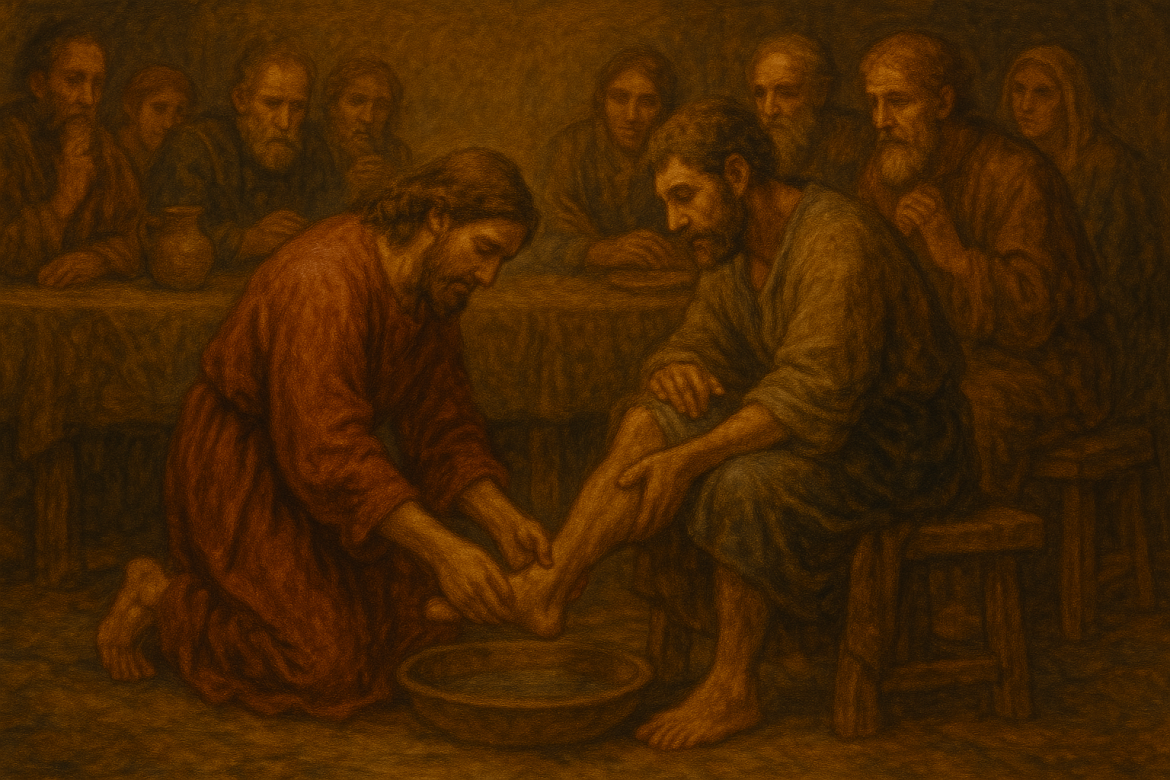In the thirteenth chapter of the Gospel of John, we encounter one of the most powerful and humbling moments in Jesus’ ministry: the washing of His disciples’ feet. This act, rich in symbolism and profound in its simplicity, provides a crucial lesson in humility, service, and love.
The Setting
The chapter begins with Jesus and His disciples gathered for the Passover feast. As the evening progresses, Jesus, fully aware that His time on Earth is drawing to a close, takes an action that leaves His disciples bewildered. He rises from the table, removes His outer garments, wraps a towel around His waist, and begins to wash the feet of His disciples. This task, typically reserved for the lowest servant, is undertaken by the Lord Himself, setting a powerful example for His followers.
Peter’s Reaction
Peter, often impulsive and outspoken, initially resists. “You shall never wash my feet,” he declares. Jesus responds with a statement that underscores the necessity of accepting His service: “If I do not wash you, you have no share with me.” Peter, understanding the gravity of Jesus’ words, immediately asks for not just his feet but his hands and head to be washed as well. This interaction highlights Peter’s evolving understanding of Jesus’ mission and the necessity of humility and acceptance in the relationship between the disciple and the Master.
Judas’ Betrayal
Amidst this act of service, the chapter also delves into the heart-wrenching betrayal by Judas Iscariot. Despite having his feet washed by Jesus, Judas remains resolute in his plan to betray Him. This juxtaposition of ultimate humility and profound treachery adds a layer of complexity to the narrative, illustrating the breadth of human response to Jesus’ love and teaching.
A New Commandment
After washing their feet, Jesus imparts a new commandment to His disciples: “Love one another. As I have loved you, so you must love one another. By this, everyone will know that you are my disciples if you love one another.” This commandment emphasizes that the mark of a true disciple is love—a love that is selfless, sacrificial, and unconditional, mirroring the love Jesus has shown.
Lessons for Today
John 13 challenges modern readers to embody the principles of humility, service, and love in their daily lives. In a world often driven by ambition and self-interest, Jesus’ example calls us to a different path. To lead is to serve, and to be great is to be humble. We are reminded that our actions toward one another, especially within the community of believers, should reflect the same selfless love that Jesus demonstrated.
The act of washing feet, while literal in the context of the narrative, serves as a metaphor for the ways we can honor and serve one another today. Whether through acts of kindness, support, or simply being present for those in need, we are called to live out the radical love that Jesus taught.
In conclusion, John 13 is not merely a historical account but a timeless lesson in the essence of true discipleship. As we reflect on this chapter, may we strive to embody the humility, service, and love that Jesus exemplified, thereby fulfilling His commandment and bearing witness to the transformative power of His love.

